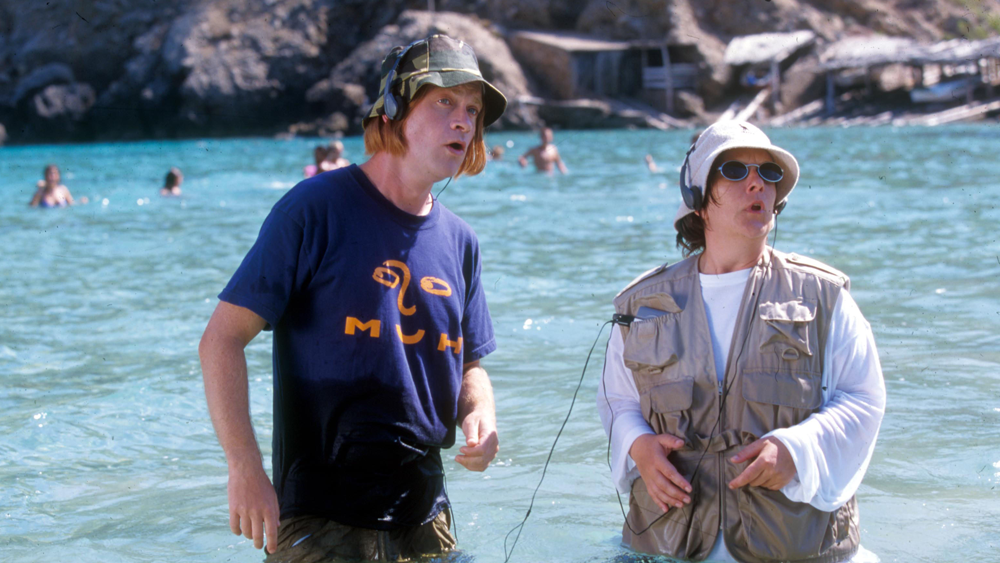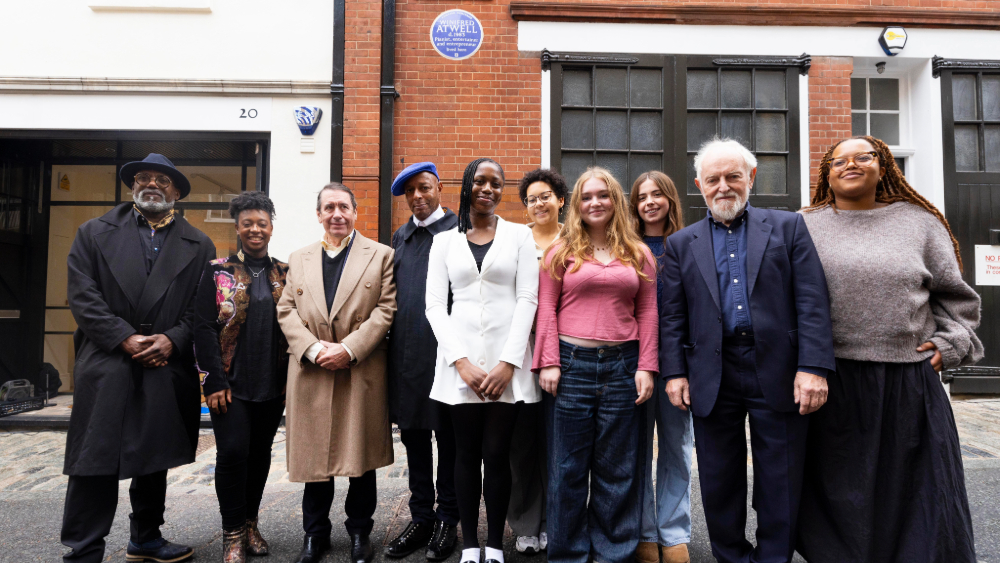Among the assorted jewels in multi-instrumentalist, producer and songwriter Dennis Bovell MBE’s crown is his score for the acclaimed 1980 film Babylon. Celebrating its 45th anniversary this month, Franco Rosso’s groundbreaking movie unflinchingly depicts the travails of ambitious Jamaican sound system DJ Blue as he encounters police brutality, racism and systemic oppression. Dennis’ propulsive score provides a fitting backdrop to the gritty south London we see in the film which, even four-and-a-half decades later, bristles with much of the same energy.
‘When I agreed to work on the Babylon score I was given a VCR, which was rare at the time,’ Dennis recalls to M. ‘Franco and his co-writer Martin Stellman then went out and shot the rushes [of footage]. I’d write to what they’d filmed, giving each character their own sounds when they were on screen.’
It proved to be a winning musical formula, adding so much to a film that continues to resonate culturally today. Singer-songwriter and DJ TYSON, who recently hosted a Babylon Q&A with Dennis at London’s Queen Elizabeth Hall, is among a new generation who are being drawn to the prevailing themes and, of course, the music in the film.
‘It’s a vital portrayal of Black Britain,’ she tells M. ‘One that definitely wasn’t shown in that way at the time, and I think still isn’t today to some extent. Babylon is also so captivating because it was made in a way that feels very real — sometimes it feels like you’re inside the story rather than [just] watching it. The landscape might look different on the surface now, but a lot of the film is more relevant than ever. Sound system culture is one of the most important foundations of London’s music scene.’
Dennis agrees: ‘It’s become a cult film. I think it was pretty daring for 1980 — [but that’s] how London was. When I reflect now on how it looks and feels, this wasn’t [filmed on] a Hollywood set. This was the way Deptford and New Cross were, with all these derelict buildings and corrugated iron. Franco made a masterpiece.’
'Babylon was pretty daring for 1980 — [but that’s] how London was.' - Dennis Bovell
Born in Barbados in 1953, Dennis was surrounded by music from an early age. His family and neighbours both had their own sound systems, and Dennis would often be asked to carry and move speakers around. After making his own dubs while at school, he kicked on with music after moving to south London in 1965, and, by the mid-seventies, was part of the Jah Sufferer Sound System and the reggae band Matumbi. It was through the latter that Dennis first met the dub poet and activist Linton Kwesi Johnson, with the pair becoming regular collaborators.
‘When we did Linton’s 1978 album [Dread Beat an' Blood] there was a TV company who were making a documentary about him, and the director was Franco Rosso,’ recalls Dennis. ‘He asked Linton if he was interested in writing music for an idea he had, which became Babylon. Linton told Franco that I was the musician, so he asked me and I agreed.’
Dennis started work on the Babylon score at Soho’s Gooseberry Studios, where he also recorded Janet Kay’s hit version of his track Silly Games. One of its highlights, Jazsterpiece, was made during a series of nocturnal sessions at Gooseberry and plays in the film as Blue journeys into central London in a Christmastime scene simmering with drama.
‘I wanted to do music that sparkled at that point and anticipated the ugliness that was about to happen,’ Dennis explains about his process. ‘To do this, I needed the same tune played at two different tempos and styles. Drummie Zeb from Aswad played this in a reggae style, then I had Bruce Smith, drummer in The Pop Group, play a punk version. I recorded both of them and then, when the scene turned ugly, I changed the drums so it went from this happiness to tension.’
Martin Stellman, who co-wrote Babylon with director Franco, remembers the ‘extraordinary recording sessions’ which took place. ‘The movie suddenly became itself when we saw the action cut to Dennis’ music,’ he tells M. ‘My favourite sequence is when Blue goes to central London, which I recently had the pleasure of hearing at the Queen Elizabeth Hall in a performance by Jazz Jamaica. The lights of London reflecting off the windscreen and the car bonnet; Piccadilly Circus… the drama, and a hint of menace, is brought out by the music. You couldn’t express it any other way.’
For Dennis, working to visual cues provided an exciting new approach to writing music: ‘I could suddenly shape my tempos by the way an actor would walk, or their activity on-screen. It was a luxury compared to how I’d been working before.’
Babylon received an X rating in the UK upon its release in October 1980, and was banned altogether in the US. ‘We didn’t quite know why [it was banned] at the time,’ Dennis recalls. ‘But I later learned this was due to Babylon’s portrayal of racism and police harassment — they didn’t want to empower the Black community. Since it came out, the world has gone upside down and the film looks like child’s play. But when it came out, Hollywood was horrified.’
That initial uproar eventually dissipated as Babylon’s merits shone through, and its appeal has since transcended generations. The Idris Elba-directed 2018 film Yardie, co-written by Martin, was inspired by the Luther actor’s love of Babylon. ‘Idris was looking for the writer behind Babylon [to work on Yardie], as it was part of his education growing up as a kid in Hackney and a huge influence,’ Martin tells M.
‘Babylon speaks to another aspect of filmmaking,’ he continues. ‘It’s like having a child who has your genes and looks similar to you, but you don’t really know how they’re going to turn out. Ultimately, after any piece of art has been released, it doesn’t belong to you any more and can go on to do things without you even knowing.’
Despite the disturbing prejudices that Blue faces in the film, the positivity within its overall story, alongside the power of music to bring people from marginalised communities together, resonates with modern-day viewers like TYSON.
‘The impact Dennis’ music has left on the world is undeniable. There’s no way it could not be inspiring,’ she says. ‘What I also really got from talking to Dennis and Brinsley Forde MBE [who played Blue] was to remember to never take life too seriously. Even with everything that happens in the film, there’s laughter in the face of it. Emotions, both good and bad, can be expressed in the dance.’
'The impact Dennis’ music has left on the world is undeniable.' - TYSON
For Dennis, Babylon was an opportunity to flex his creative muscles and work with some of his favourite musicians, such as Aswad's Drummie Zeb and Tony 'Gad' Robinson.
‘The whole thing was a chance for me to show how I could write and [create] a soundtrack that wasn’t just songs that had been selected from previously released material,’ he says. ‘I’d been commissioned to exclusively write for this film, so I surrounded myself with the right musicians who could do what I wanted. Drummie and Tony were with me in the studio 24/7.’
Now in his seventies, Dennis is still very much in demand as a producer, artist and DJ. He’s also a fount of knowledge for emerging music creators, and believes the recipe for writing a successful score is simple.
‘You need to pay attention to the script and write music that lends itself to it, as well as being fast at working and writing music,’ he says. 'Anyone who gets the chance to write music that is put to film needs to read the script, watch the film and get into the mood of the characters and the storyline — that should inform your music. You have to knit with the script: that’s why the music in Babylon has had an impact for so long.’





